 |
Holistic
intelligence is a
sage, focused intelligences are
his students. Few students learn
wisely.
~
Vadim Kotelnikov |
|
Intelligence is the capacity to
process data, perceive or infer
information, and turn them into
knowledge, as well as the
ability to apply this knowledge
to adapt thinking, behaviors,
strategies and actions within an
environment or contest.
|
|
| |
|
Higher and Lower Intelligences
|
|
|
| |
Each human being is a
combination of higher and lower
self.
Our higher
intelligence designs and leads
our effectiveness journey.
Our lower intelligence manages
our efficiency and productivity.
|
|
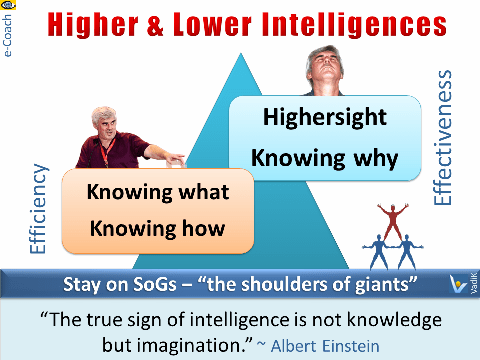 |
| |
|
Universal Yin-Yang Intelligence
|
|
|
| |
The ultimate creative
intelligence is
Yin-Yang intelligence. It is
about knowing how to make the
universal forces of creative
Yang and adaptive Yin
waltz up as a harmonious
whole towards a daring vision or
a stretch goal.
|
|
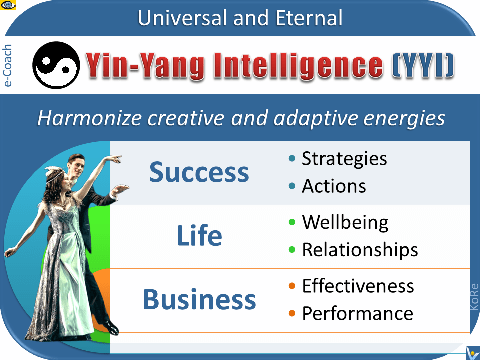 |
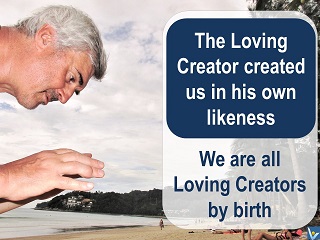 |
|
Creative Intelligence
Creative intelligence is an
ability of being creative, using
passion, imagination,
unconventional thinking,
creativity skills, creative
confidence, and
deep immersion,
to generate new, valuable, and
diverse outcomes that include
ideas, concepts, designs,
solutions, approaches, artworks,
and performances.
|
|
| |
Intuitive Intelligence
Intuitive intelligence makes
people wise. It enables you to
see the many results of
possibilities and select the
best possibility quickly.
|
|
Intuition
Supraconscious Intuition |
|
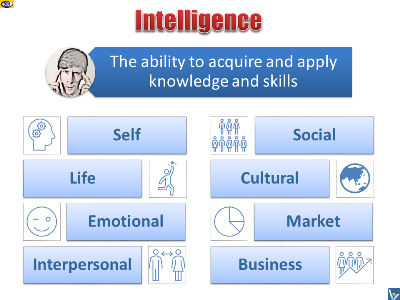 |
|
Focused intelligences define the capacity for
self-awareness,
empathy,
insights,
understanding,
emotional knowledge,
logic, reasoning,
critical thinking,
creativity,
discovery and
problem
solving, as well as the ability to
apply, grow, and manage these
capacities. |
|
| |
|
Artificial Intelligence (AI)
|
|
|
|
|
|
|
"Intelligence is an elusive concept. There's a
certain sharpness, an ability to absorb new facts. To ask an
insightful
question. To absorb it in real time. A capacity to
remember. To relate to
domains that may not seem connected at first. A certain
creativity that allows
people to be effective."
~
Bill Gates
|
|
|
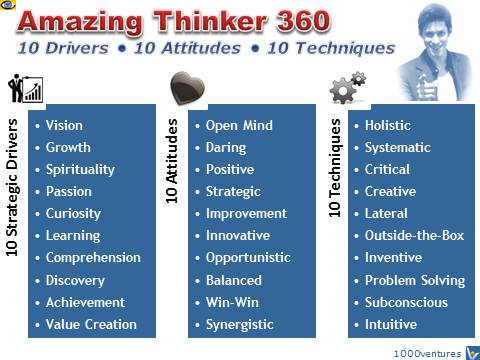 |
|
The Power of Intelligence
Intelligence gives you cognitive
abilities to learn, understand, form
concepts, and reason, including the
capacities to recognize patterns,
invent, create, discover, plan,
solve problems, innovate,
communicate, persuade and influence
others.
For instance, social intelligence
gives you cognitive ability to
understand the social cues and
motivations of others and yourself
in social situations. It helps you
to make correct judgments of others
as well as to develop positive
social character.
Intelligence vs. Learning
Learning refers to the act of
acquiring and retaining information
or abilities and being able to
recall them for future use.
Intelligence is a cognitive ability
to perform these and other
processes. |
|
Competitive Intelligence
Existential
Intelligence
Spiritual
Intelligence
Perceptual
Intelligence
World Intelligence (WQ)
Human Intelligence
Models of Intelligence
Activities
Outside-the-Box Intelligence
Technology
Intelligence
Intelligence
Activities
Types of Questions
 |
The sign of intelligence is that you are constantly wondering.
Idiots are always dead sure about every damn thing they are doing in
their
life. |
Sadhguru |
|
Here are some of the different
types of intelligence and intelligent people
¤ observation intelligence
These people are always picking up small gestures that
humans and universe gives off to come to complex or simple
conclusions,, usually being finding the truth and or false,
can spot out good and bad people or concepts or ideologies
Cross-Cultural Competency
A globally connected world is
a key driver of structural change for the global workforce.
The diversity of stakeholders
is an important point to consider. Employee, customers,
partners, competitors are all made up of people of different
ethnical backgrounds, who have different views, perceptions,
beliefs, and values.
Innovation became a systemic
phenomenon. It is achieved through synergizing diversities
and is increasingly more dependent on the collaboration
between actors from different cultural backgrounds who
combine their own perceptions, thinking habits and expertise
to create something new. This happens on all levels −
individual, team, institutional. Diversity of thought
increases creativity and, with it, the innovation potential
of individuals, teams, corporations and joint ventures.
Business activities that take
place abroad emphasize the importance of cultural
intelligence and effective cross-cultural communication
between the business and local people. Unless company
representatives have good understanding of the local
traditions and values, they might behave in such a way that
is considered offensive or inappropriate in another culture
and facilitate conflict, putting the whole local business at
risk. In order to effectively perform business activities in
a different cultural setting, company representatives must
possess such soft skills, as sociocultural competence and
empathy.
Groundbreaking Soft Skills
empower you to create remarkable positive change in
yourself, your organization and its business.
|
|